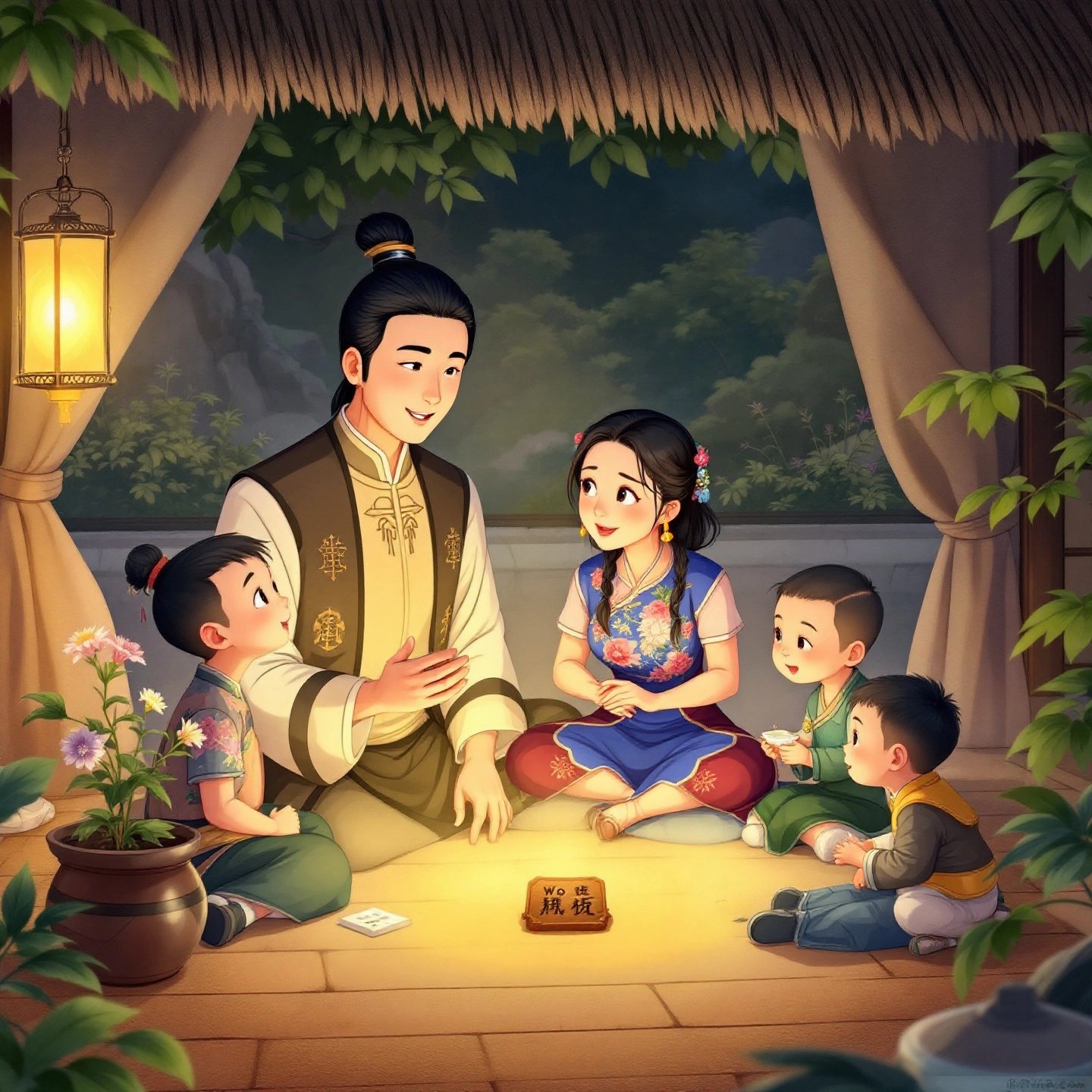Introduction to Chinese Nicknames
Chinese nicknames are more than just casual monikers; they are vibrant expressions of affection and intimacy that permeate everyday interactions. In China, these nicknames, known as "昵称" (nì chēng), are woven into the fabric of personal and social relationships, offering a glimpse into the warmth and charm of Chinese culture. Imagine walking through a bustling market in Beijing, where friends call out to each other using playful nicknames that capture shared memories or endearing traits. It's a scene that highlights the deep cultural significance of these terms.
In the chapters that follow, we will explore the fascinating world of Chinese nicknames, from their historical roots to their modern-day applications. You'll discover how these affectionate terms have evolved over time, influenced by cultural norms and societal changes. We will delve into the nuances of traditional versus modern nickname styles, examining how context, tone, and generational differences shape their creation. Furthermore, we will uncover the romantic and playful dimensions of nicknames used between lovers, friends, and family, offering insights into how these expressions strengthen emotional bonds.
As you journey through this exploration, you'll gain a deeper understanding of why Chinese nicknames are cherished as more than mere labels. They reflect the values of community and connection that are central to Chinese society. Whether you are learning Mandarin, planning to visit China, or simply curious about cultural nuances, understanding these nicknames offers a unique window into the heart of Chinese interpersonal interactions. So, let's embark on this cultural exploration and uncover the layers of meaning behind these charming and significant expressions.

Why Chinese Nicknames Are Deeply Significant
Chinese nicknames, or "昵称" (nì chēng), are more than simple labels; they are steeped in cultural and historical significance that reflects the rich tapestry of Chinese society. The tradition of using a nickname in Chinese culture dates back centuries, serving both practical and sentimental purposes. Imagine being in ancient China, where a nickname could protect a child from malevolent spirits or express a family's hopes for their future. This deep-rooted practice highlights the emotional depth and sense of belonging these names can foster.
Key Historical Milestones
- Ancient Protection: During ancient times, nicknames were often used to protect children from evil spirits. Parents would choose humble or humorous names to avoid attracting unwanted attention from these spirits, as detailed in historical accounts from the Yoyo Chinese Blog.
- Confucian Influence: The Confucian emphasis on family and hierarchy also influenced nickname practices. Courtesy names, given at adulthood, were a sign of respect and reflected a person’s virtues, aligning with societal values of the time.
- Modern Adaptations: Today, nicknames continue to evolve, blending traditional elements with modern influences, reflecting changes in societal norms and globalization.
Cultural Influences and Values
The cultural significance of a Chinese nickname is further enriched by its ability to convey affection and familiarity. In many cases, these names are derived from nature, personal traits, or even familial aspirations, as noted in the Wukong School Blog. This practice underscores the value placed on individuality and personal connections within Chinese culture.
- Expressions of Love: Nicknames often express love and affection, used predominantly by family and close friends, creating a sense of intimacy and warmth.
- Symbolic Meanings: Many nicknames carry symbolic meanings, reflecting the virtues or wishes parents have for their children, such as strength or happiness.
- Social Bonds: By using nicknames, individuals reinforce social bonds, highlighting the importance of community and connection in Chinese society.
Understanding the cultural and historical context of Chinese nicknames offers a window into the values that have shaped and continue to influence Chinese society. As we transition to exploring the styles and nuances of these affectionate terms, you'll see how they continue to evolve, adapting to modern contexts while retaining their deep-rooted significance.
Exploring Popular Styles and Cultural Nuances of Chinese Nicknames
When it comes to crafting a nickname in Chinese, the approach can vary significantly between traditional and modern methods, each reflecting different cultural values and societal influences. Understanding these nuances not only enriches your appreciation of Chinese culture but also enhances your ability to engage meaningfully with native speakers.
Traditional Approaches
Traditionally, Chinese nicknames are deeply rooted in cultural heritage and familial customs. They often draw from familial aspirations or characteristics observed in the individual, as mentioned in the Ancestry Blog. Here are some key aspects:
- Generational Names: These are used to signify family lineage and continuity. For example, siblings might share a common character in their nickname that denotes their generation.
- Symbolism: Traditional nicknames often incorporate elements of nature or virtues, such as "小龙" (xiǎo lóng) meaning "little dragon," symbolizing strength and power.
- Respect and Hierarchy: In line with Confucian values, nicknames might reflect a person's role within the family or community, emphasizing respect and social order.
Modern Trends
In contrast, modern Chinese nicknames are influenced by globalization and contemporary culture, often reflecting more playful or casual tones. This shift is evident in how younger generations create and adopt nicknames:
- Western Influence: Many modern Chinese nicknames incorporate English words or sounds, creating a blend of cultures that appeals to younger individuals.
- Pop Culture References: Nicknames might be inspired by popular movies or celebrities, reflecting current trends and interests.
- Personal Traits: Modern nicknames often highlight unique personal traits or inside jokes, making them highly personalized and context-specific.
Factors Influencing Nickname Creation
The creation of a Chinese nickname is influenced by several factors, including:
- Tone and Context: The tone used can change the meaning of a nickname significantly, as Chinese is a tonal language. Context also plays a crucial role, as the same nickname might be affectionate in one setting and inappropriate in another.
- Generational Differences: Older generations might prefer traditional nicknames that reflect cultural heritage, while younger people lean towards modern, trendy options.
- Social Dynamics: The closeness of the relationship between individuals often dictates the level of formality or playfulness in a nickname.
In conclusion, whether traditional or modern, a nickname in Chinese is a powerful tool for expressing identity and building connections. As we move forward, we'll delve into the romantic side of Chinese nicknames, exploring how these affectionate terms can strengthen relationships between lovers.

Romantic Terms for Strengthening Relationships
In the realm of romantic relationships, the use of nicknames transcends mere words, becoming a powerful tool for expressing love and affection. Chinese girlfriend nicknames and Chinese nicknames for boyfriend are particularly significant, as they encapsulate the nuances of personal chemistry and cultural respect. Imagine calling your partner by a name that not only reflects your unique bond but also honors cultural traditions—it's a gesture that deepens emotional connections.
Popular Chinese Girlfriend Nicknames
- 太太 (Tàitài): While it means "wife," using it affectionately for a girlfriend can signify a deep commitment.
- 小公举 (Xiǎo gōng jǔ): Translating to "little princess," this nickname is perfect for showing adoration and making your partner feel cherished.
- 妞妞 (Niū niū): Meaning "little girl," it’s used playfully to express endearment and affection.
Endearing Chinese Nicknames for Boyfriend
- 先生 (Xiān shēng): Often used to denote respect and admiration, akin to calling someone "mister."
- 哥哥 (Gēgē): Meaning "older brother," it conveys a familial closeness and affection.
- 老公 (Lǎo gōng): Translated as "husband," it's a term of endearment that suggests a long-term commitment.
These nicknames are more than just words; they are expressions of the unique dynamics between partners. They carry the weight of cultural significance while being tailored to the personal nuances of the relationship.
For couples seeking to craft culturally resonant and heartfelt nicknames, the Chinese Name Generator offers a valuable resource. This tool combines traditional and modern elements to create names that are not only meaningful but also reflective of individual style and connection.
Ultimately, the impact of these romantic nicknames lies in their ability to convey deep emotions and respect for cultural nuances. By choosing the right nickname, couples can strengthen their bond, creating a shared language of love that transcends everyday interactions. As we continue our exploration, we’ll look at how playful and cute nicknames further enhance the bonds between couples.
Cute Ways to Express Affection as a Couple
When it comes to expressing affection in relationships, cute Chinese nicknames play a pivotal role in adding a layer of intimacy and playfulness. These nicknames, often filled with endearing and humorous undertones, serve as a private language between partners, reinforcing the bond they share. Imagine calling your partner by a name that makes them smile instantly—a simple yet profound way to show love and appreciation.
Playful and Sweet Variations
- 小宝贝 (Xiǎo bǎobèi): Meaning "little treasure," this nickname is perfect for expressing how precious your partner is to you.
- 甜心 (Tiánxīn): Translating to "sweetheart," it conveys warmth and affection, much like calling someone "honey" in English.
- 萌宝 (Méng bǎo): This playful term means "cute baby," ideal for partners who enjoy a lighthearted and fun dynamic.
- 小可爱 (Xiǎo kě'ài): Meaning "little cutie," this nickname is both affectionate and charming, perfect for making your partner feel adored.
Inside-Joke-Inspired Terms
Inside jokes are a hallmark of close relationships, and incorporating them into nicknames can make them even more special. For instance, if a couple shares a funny memory involving a specific animal, they might use that animal's name as a nickname, adding a layer of personal significance.
Reinforcing Bonds Through Lighthearted Expressions
Using Chinese affectionate nicknames not only enhances the emotional connection between partners but also adds a playful element to the relationship. These nicknames are often used in moments of joy and tenderness, serving as reminders of shared experiences and mutual affection. By choosing a nickname that resonates with both partners, couples can create a unique bond that is both meaningful and fun.
As we explore further into the realm of Chinese nicknames, the next chapter will delve into how these terms of endearment extend beyond romantic relationships, enriching friendships and familial ties with their charm and cultural depth.
Fun Ideas for Friends and Family Connections
Chinese nicknames are not just reserved for romantic partners; they extend to friends and family, playing a crucial role in strengthening these bonds. Whether it's a Chinese nickname for friends or for children, these terms often carry playful and affectionate meanings that enhance social connections. Imagine calling your best friend by a nickname that encapsulates your shared experiences or a child by a name that reflects their adorable personality. These nicknames create a sense of belonging and familiarity.
Chinese Nicknames for Friends
- 老铁 (Lǎo tiě): Translating to "old iron," this term is used among close friends to symbolize a strong, enduring friendship.
- 死党 (Sǐ dǎng): Meaning "sworn friend," it reflects unwavering loyalty and is often used for best friends.
- 兄弟 (Xiōngdì): Literally "brother," this nickname signifies a bond akin to family among male friends.
- 姐们儿 (Jiěmenr): Used among female friends, it conveys a sisterly bond.
Chinese Nicknames for Children
- 小宝贝 (Xiǎo bǎobèi): Meaning "little treasure," it's a common affectionate term for children.
- 小不点 (Xiǎo bù diǎn): Translating to "little bit," it emphasizes the small size and cuteness of a child.
- 小公主 (Xiǎo gōngzhǔ): Meaning "little princess," it’s often used for daughters.
- 小虎 (Xiǎo hǔ): Meaning "little tiger," this nickname implies strength and bravery.
Fun and Edgy Styles
Beyond traditional nicknames, funny Chinese nicknames add humor and lightheartedness to relationships. These nicknames often arise from shared jokes or playful teasing:
- 土豆 (Tǔ dòu): Meaning "potato," it's a humorous nickname for someone who likes to lounge around.
- 胖子 (Pàngzi): Translating to "fatty," it's used affectionately among close friends or family.
- 笨蛋 (Bèndàn): Meaning "dumb egg," it’s a playful term for a friend who makes a funny mistake.
Casual vs. Formal Nickname Contexts
| Context | Casual Nicknames | Formal Nicknames |
|---|---|---|
| Friends | 老铁 (Lǎo tiě), 死党 (Sǐ dǎng) | 先生 (Xiānshēng), 小姐 (Xiǎojiě) |
| Children | 小宝贝 (Xiǎo bǎobèi), 小不点 (Xiǎo bù diǎn) | 大名 (Dàmíng), 小名 (Xiǎomíng) |
| Family | 小公主 (Xiǎo gōngzhǔ), 小虎 (Xiǎo hǔ) | 堂兄 (Tángxiōng), 堂姐 (Tángjiě) |
Understanding when and how to use these nicknames appropriately can enhance your interactions, making them more meaningful and enjoyable. As we continue, we’ll explore how English adaptations shape the landscape of Chinese nicknames, blending cultures and creating unique expressions.

How English Adaptations Shape Chinese Nicknames
In recent years, the blending of English and Chinese languages has given rise to unique naming trends, particularly in the realm of Chinese nicknames in English. This cultural fusion is not only a reflection of globalization but also a testament to the adaptability and creativity of language. Imagine a world where names transcend cultural boundaries, creating a bridge between diverse linguistic landscapes. Sounds intriguing, right?
One of the most notable influences is the process of transliteration, where sounds from one language are adapted into another. This is particularly evident in the realm of sports, with Chinese NBA nicknames serving as a prime example. For instance, basketball legend Michael Jordan is often referred to as "乔丹" (Qiáo dān) in Chinese, a phonetic adaptation that maintains the essence of his name while fitting into the Chinese sound system.
But how do these adaptations occur? The process involves selecting Chinese characters that closely resemble the phonetic sounds of the original English names. This method not only preserves the original name's pronunciation but also often imbues it with additional meanings through the chosen characters. For example, the name "Jordan" becomes "乔丹" (Qiáo dān), where "乔" can imply "tall" or "outstanding," adding a layer of meaning that resonates with Jordan's stature and legacy.
Common Borrowed Words and Phonetic Adaptations
- Brand Names: Many Chinese speakers adopt brand names as nicknames, such as "Bvlgari" or "Rolex," reflecting a sense of luxury and status.
- Western Names: Names like "Jack" and "Jane" are transliterated into "杰克" (Jié kè) and "简" (Jiǎn), respectively, maintaining the original sound while integrating into the Chinese lexicon.
- Pop Culture References: Characters from movies and TV shows often inspire nicknames, such as "Harry Potter" becoming "哈利波特" (Hā lì bō tè).
- Phonetic Similarities: Names that sound similar to Chinese words are often chosen for their pleasing phonetic match, such as "Kitty" for "Kit."
This cross-cultural exchange not only enriches the lexicon of Chinese nicknames but also fosters a sense of global identity among younger generations. By blending English phrases into Chinese linguistic patterns, these nicknames resonate with a broader audience, offering a modern twist on traditional naming conventions.
As we continue our exploration, we will delve into how these adaptations influence not only personal interactions but also the broader cultural landscape, shaping the way Chinese speakers engage with the world. Next, we’ll look at the role of celebrities in popularizing these naming trends, offering inspiration for the best Chinese nicknames in today's pop culture.
Celebrity Inspiration and Modern Pop Culture Trends
In the vibrant world of pop culture, Chinese celebrity nicknames stand out as fascinating examples of how language and creativity intertwine. These nicknames often reflect the unique public personas of celebrities, offering a playful or humorous twist that resonates with fans. Imagine calling your favorite star by a name that captures their essence in a way that is both endearing and culturally insightful. Sounds intriguing, right?
Chinese fans have a knack for crafting nicknames that are both witty and reflective of a celebrity's image or reputation. For instance, Katy Perry is affectionately known as "水果姐" (shuǐguǒ jiě), or "Fruit Sister," due to her vibrant, fruit-themed costumes in music videos. Similarly, Justin Timberlake earns the moniker "贾老板" (jiǎ lǎobǎn), or "Boss Jia," recognizing his entrepreneurial ventures beyond music.
Notable Pop Culture Examples
- Katy Perry - 水果姐 (shuǐguǒ jiě): Reflecting her colorful and fruity stage presence.
- Justin Timberlake - 贾老板 (jiǎ lǎobǎn): Highlighting his business acumen and investments.
- Nicki Minaj - 麻辣鸡 (málà jī): Translating to "Spicy Chicken," a nod to her bold and fiery personality.
- Leonardo DiCaprio - 小李子 (xiǎo lǐzǐ): Meaning "Little Plum," a cute and affectionate nickname.
These examples illustrate how Chinese nicknames for celebrities often incorporate elements of humor, admiration, and cultural references, making them memorable and beloved by fans. But it's not just Western celebrities who receive such creative treatment. Chinese stars also enjoy unique monikers that reflect their public personas or iconic roles.
Intriguing Cultural Trivia
Beyond individual nicknames, cultural trivia adds another layer of interest. For example, did you know that the city of Chengdu is nicknamed the "Hibiscus City" due to its historical association with the hibiscus flower? Such trivia enriches our understanding of how nicknames and cultural identity are intertwined in China.
As we continue to explore the fascinating world of Chinese nicknames, we see how these creative expressions shape modern trends and reflect broader cultural dynamics. Next, we'll delve into the tools and resources available for crafting your own personalized Chinese nickname, blending tradition with innovation.

Practical Tools for Creating the Ideal Chinese Nickname
When it comes to crafting a unique and meaningful Chinese nickname, the use of a Chinese nickname generator can be a game-changer. These tools leverage advanced AI algorithms to provide users with culturally authentic and personalized name suggestions. Imagine having the ability to create a nickname that not only reflects your personal style but also honors the rich traditions of Chinese culture. Sounds complex? Let’s simplify it.
Using a Chinese Nickname Generator
One of the most effective tools available is the CNG Chinese Name Generator. This platform offers a uniquely AI-driven way to create names that are both authentic and modern. Here’s how you can use it to your advantage:
- Step 1: Input Details: Start by entering key details such as personality traits, interests, or even a Chinese zodiac sign. This input helps tailor the nickname to fit the individual’s characteristics.
- Step 2: Generate Options: With a simple click of the “Generate” button, the tool provides a variety of nickname options. These suggestions blend traditional elements with contemporary flair, ensuring each name is unique and meaningful.
- Step 3: Review and Select: Browse through the generated nicknames and select one that resonates with the person’s essence. This selection process allows for a personal touch, making the nickname truly special.
- Step 4: Customize Further: If desired, you can further personalize the chosen nickname by incorporating personal sentiments or inside jokes, adding an extra layer of meaning.
Creating Chinese Nicknames for Boyfriends
For those seeking Chinese nicknames for boyfriend with meaning, these tools can be particularly beneficial. By considering the dynamics of your relationship and cultural nuances, you can craft a nickname that reflects both affection and respect.
- Consider Cultural Symbols: Use symbols that represent virtues or traits admired in your partner, such as "龙" (lóng) for strength or "星" (xīng) for brilliance.
- Blend Modern and Traditional Elements: Combine traditional Chinese characters with modern slang or phonetic adaptations to create a nickname that feels both timeless and trendy.
- Reflect Personal Bonds: Incorporate elements from shared experiences or inside jokes to make the nickname a unique expression of your relationship.
Ultimately, the goal is to create a nickname that not only resonates with the individual but also strengthens the bond between you. By using a Chinese nickname generator, you can explore a wide array of options and find the perfect balance between tradition and modernity.
As we conclude our exploration of Chinese nickname generators, consider how these tools can enhance your interactions and personal connections. In the final chapter, we’ll summarize the core insights from our journey, encouraging you to explore your own creative paths in developing meaningful, culturally attuned nicknames.
Concluding Thoughts on the Cultural Richness of Chinese Nicknames
As we wrap up our exploration of Chinese nicknames, it’s clear that these affectionate terms are more than just casual labels—they are profound expressions of cultural identity and personal connection. From their historical roots to their modern-day adaptations, Chinese nicknames offer a fascinating glimpse into the values and traditions that shape interpersonal relationships in China. Imagine the warmth of being called by a name that captures your essence and the unique bond you share with others. It’s a testament to the power of language in forging deep emotional ties.
Throughout our journey, we’ve delved into the significance of nicknames in various contexts—be it romantic, familial, or among friends. Each nickname carries a layer of meaning that transcends its literal translation, often reflecting the virtues, aspirations, or shared memories of those involved. Whether it’s a playful nickname between lovers or a cherished term of endearment for a child, these names embody the rich tapestry of Chinese culture.
As you consider incorporating meaningful Chinese nicknames into your own interactions, remember that the most impactful names are those that resonate personally with both the giver and the receiver. They are crafted with care, reflecting the nuances of your relationship and the cultural context in which they are used. By exploring your creative paths and embracing the cultural depth of these nicknames, you can enhance your connections and create a unique language of affection.
So, as you venture into the world of Chinese nicknames, let your creativity and cultural appreciation guide you. Whether you’re looking to strengthen existing bonds or forge new ones, these charming expressions offer a timeless way to connect with others on a deeper level. Embrace the beauty of these names and the stories they tell, enriching your relationships with warmth, humor, and a touch of cultural elegance.
Frequently Asked Questions
1. What is a good Chinese nickname?
A good Chinese nickname reflects affection and cultural significance. Examples include 宝贝 (Bǎobèi) for 'treasure' and 亲爱的 (Qīn'ài de) for 'dear'.
2. How do Chinese people give nicknames?
Chinese nicknames often use prefixes like 小 (Xiǎo) or 阿 (Ā) with a surname or given name character, creating an affectionate and familiar tone.
3. How to create a Chinese nickname?
Creating a Chinese nickname involves repeating the last character of a person's name or using traits and inside jokes to personalize the nickname.
4. What are some popular Chinese nicknames for friends?
Popular nicknames for friends include 老铁 (Lǎo tiě) meaning 'old iron' and 死党 (Sǐ dǎng) for 'sworn friend', reflecting strong bonds.
5. How do English adaptations influence Chinese nicknames?
English adaptations in Chinese nicknames often use transliteration, preserving original sounds while adding cultural meaning, like 乔丹 (Qiáo dān) for 'Jordan'.



